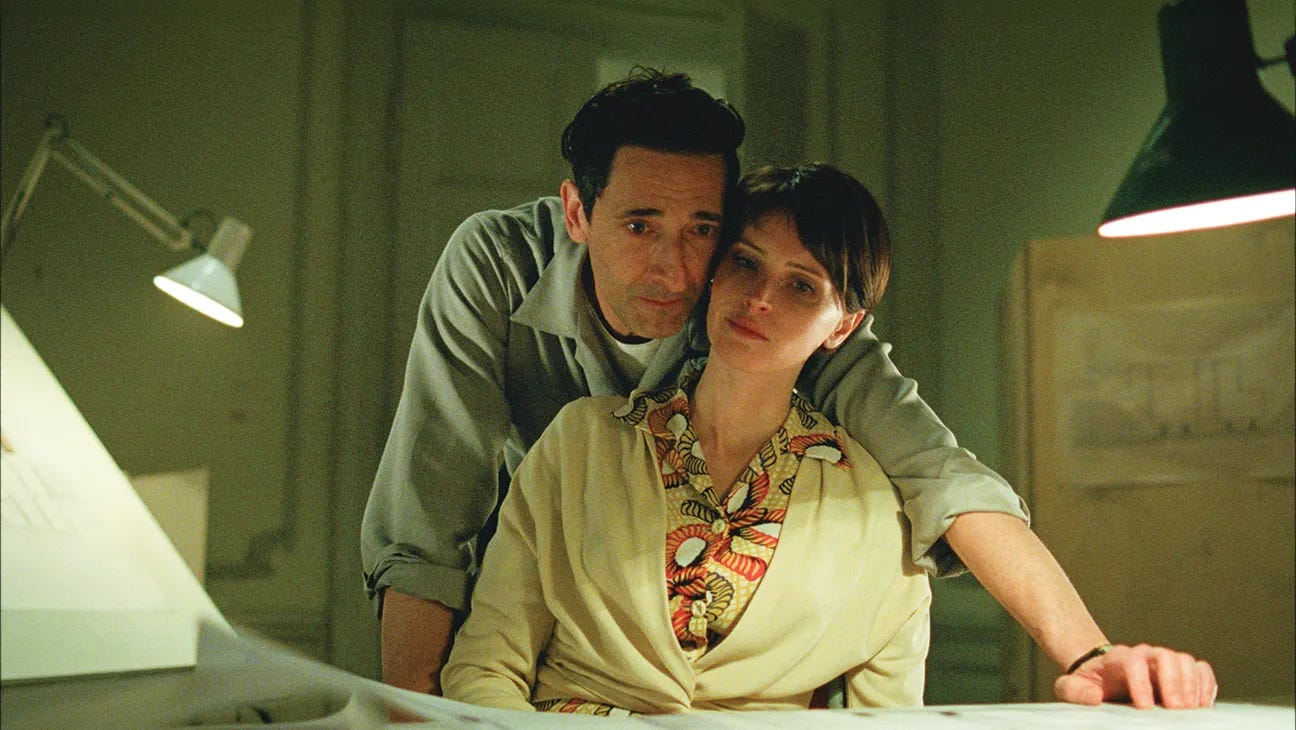In Review: 'The Brutalist,' 'Mufasa: The Lion King'
This week brings a new American epic and the story of what happened before a beloved Disney movie.
The Brutalist
Dir. Brady Corbet
215 min.
At the heart of The Brutalist—Brady Corbet’s epic in length, scale, and scope third film—is a mammoth architectural project, a modernist community center designed to be built atop a field in the Pennsylvania countryside where it will be visible for miles. It’s intended as a statement, though the building’s Hungarian-immigrant architect László Tóth (Adrien Brody) and Harrison Lee Van Buren (Guy Pearce), the wealthy industrialist who commissioned it, are never in complete alignment about what that statement is. For each man, the complex serves as both a commentary on the past and a vision of the future, but these definitions can remain a little tough to pin down, too. The title of The Brutalist, itself a slippery choice, refers to the style of László’s work, which emphasizes minimalist forms and unadorned raw material. But to confuse this approach for simplicity would be a mistake.
Corbet’s approach is not a case of a film imitating the form of its subject, at least not entirely. Alternately elegant and immediate, The Brutalist teems with the sometimes grimy details of post-war American life, particularly in the first of its two halves, which often plays like a tour of the back alleys, porn theaters, and homeless shelters of those living unrealized American dreams and the habits they pick up there. Yet it’s also a film in which every detail plays a part and even moments that pass without comment linger over what follows. Nothing you see is by accident and small details accumulate layers of significance as time passes.
A survivor of the Holocaust, László arrives in America without his wife Erzsébet (Felicity Jones) or his niece Zsófia (Raffey Cassidy), a mute teenager. What at first seems like a minor paperwork issue becomes a seemingly irresolvable snag as László joins his cousin Attila (Alessandro Nivola) and Attila’s wife Audrey (Emma Laird) in Philadelphia, where they run a mom-and-pop furniture shop. It’s an awkward reunion from the start. László remains an observant Jew but Attila has converted to Catholicism at Audrey’s urging. As lodging, the couple offers only a (barely) converted stockroom with no bathroom of its own. László’s furniture designs introduce an eye-catching modernity to the store’s fusty stock, but that doesn’t translate into sales. When Harry (Joe Alwyn), Harrison Lee Van Buren’s free-spending son, contracts Attila and László to remake his father’s stodgy, airless study into a striking, spare space of László’s design, it seems like the architect’s fortunes might change. And they do, but not immediately for the better. And, perhaps, not for the better in the long term, either.
America, we’re often told, is the Land of Opportunity, but those who use that phrase tend to ignore that “opportunity” is a value-neutral word. It can mean the chance for success but also humiliating failure. When Harrison becomes enraged to discover a remodeling job he did not commission in a style he does not understand, he sets into motion a chain of events that leaves László homeless. This, in turn, leads to another chain of events that earns László the ambitious community center commission and the opportunity to bring Erzsébet and Zsófia to the States—a man with connections can do this—but these developments bring consequences of their own.
The Brutalist is about a single building in much the same way There Will Be Blood tells the story of a single oil company. It’s one self-contained narrative that serves as an emblem of another, much bigger story. The conflicts between its characters determine nothing less than the image of America’s future and its understanding of its past. Here, that rests on the sometimes fractious partnership of a self-made millionaire who’s become a giant in a young country and a refugee from the tumult and hatred of an old one. Sometimes it becomes hard for László to tell the Old World and New World apart. In the former, his work met with acclaim in his early years before being declared insufficiently Germanic. In the latter, it’s greeted by some with a hostility that may be no less anti-semitic at its root. Pearce and Brody, both doing some of the best work of their careers, make their characters feel like stand-ins for larger forces without losing their stubborn, sometimes ugly, humanity.
Corbet and co-writer Mona Fastvold nest smaller arcs within the framework of the project. Erzsébet, a journalist in her old life, finds diminished prospects in America. Zsófia arrives with the enigma of her muteness unresolved, a subplot that takes several unexpected turns. As the years pile up, the world changes and the relationships become more complex. At this point, it’s worth mentioning that The Brutalist’s unusual running time—the film takes the form of two acts and an epilogue—is not only appropriate, it's essential. The rhythm of the film feels at once deliberate and deliberately unpredictable and the focus shifts freely from one set of characters to another. (The supporting cast also includes memorable turns from Zachari Bankolé as a fellow immigrant who becomes László’s friend, co-worker, and drug partner and Stacy Martin as Harry’s twin sister.) The second half moves to Italy for a consequential trip abroad. Jumps in time arrive with little warning and what happens in the space between, though never seen, takes on as much significance as what is depicted. The Brutalist is a big movie in every sense and, like the landmark-in-progress that becomes the film’s focal point, its greatness is not in its size but what it contains. —Keith Phipps
The Brutalist opens in limited release this weekend.
Mufasa: The Lion King
Dir. Barry Jenkins
118 min.
A story that did not need to be told brought to life by talent far too overqualified to tell it, Mufasa: The Lion King might be the movie the future points to as an emblem of everything wrong with studio filmmaking in the 2020s. It’s a confluence of one questionable cinematic trend after another: a franchise-extending prequel to a remake of an animated classic done in a photorealistic style that drains away the original’s expressive charm in favor of ripped-from-the-pages-of-National Geographic imagery that’s as technically impressive as it is soulless. The names in the credits suggest the impossibility of achieving memorable creative results within those restrictions. Barry Jenkins has directed three remarkable features (Medicine for Melancholy, Moonlight, and If Beale Street Could Talk) and an equally remarkable miniseries (The Underground Railroad) but little about Mufasa suggests his presence. Lin-Manuel Miranda has previously seemed incapable of writing a less-than-catchy song, but good luck humming any of his contributions as you exit the theater.
Framed as a tale told by the sage mandrill Rafiki (John Kani) to comfort the royal lion cub Kiara (Blue Ivy Carter)—despite being filled with death and betrayal—the bulk of the film recounts how Simba’s father Mufasa (voiced as a young adult by Aaron Pierre) became separated from his parents and folded into another lion family after befriending Taka (Kelvin Harrison Jr.), the heir to a kingdom presided over by Obasi (Lennie James). Obasi has little interest in opening up his pride to outsiders, only reluctantly allowing Mufasa to stay on as he grows to adulthood. But when the pride becomes threatened by a menacing band of lion outkasts with white fur, led by the fearsome Kiros (Mads Mikkelsen), Obasi charges Mufasa with protecting Taka as they flee. On the run they’re joined by the fetching lioness Sarabi (Tiffany Boone), a young Rafiki (Kagiso Ledigi), and the hornbill Zazu (Preston Nyman, taking over for John Oliver) as they embark on a semi-incredible journey to a storied paradise.
At once handsome and dull, Mufasa never finds a compelling reason to exist beyond filling in some blank pages in the Lion King mythos that never seemed like they needed to be filled. This includes the origin story of the original film’s villain, Scar, whose identity should probably be evident from the plot description, though the film treats it as a reveal as momentous as Luke Skywalker’s dad. The frequent cuts to the framing device, where Rafifi and Kiara are joined by the wisecracking Timon (Billy Eichner) and Pumbaa (Seth Rogen), provide the only real jolts of energy but play as if Eichner and Rogen were given free rein to do whatever was necessary to liven things up. If animated animals produced flop sweat, their scenes would be thick with it. They’re not the only ones who obviously put a lot of effort into this IMAX-friendly screensaver of a movie, though, and that’s part of what makes it all the more disappointing. A lot of work from extremely talented people went into this spectacular mediocrity with a spot on Disney+’s “Lion King Collection” page already carved out for it. Mufasa isn’t a disaster, it’s worse: a waste of everyone’s time. —Keith Phipps
Mufasa: The Lion King opens in theaters everywhere tonight.








As a father, I have seen many movies that I was not excited about. I’m seeing Sonic 3 in 4DX (which, don’t get me started), this very weekend. My child has expressed mild interest in Mufasa and I’ve mostly done the “mm-hm”-and-nod thing.
But we’re all adults here so I can be honest: I will be damned. I will be damned if I will sit through this movie because it seems like the end product of virtually every kind of bad decision about what films to make in the 2020s. As a wildly unwise man once said, I’m talking about drawing a line in the sand, dude.
The Brutalist, however: I may see it alone but I will see the finest possible presentation of it on opening weekend. Can’t wait.
"Lin-Manuel Miranda has previously seemed incapable of writing a less-than-catchy song"
Sir, while I respect your overall point, I must gravely force you to listen to The Scuttlebutt now, a song that sounds like an amazing parody of LMM Disney tunes but is 100% real.
https://www.youtube.com/watch?v=N4ovRhX8XIM